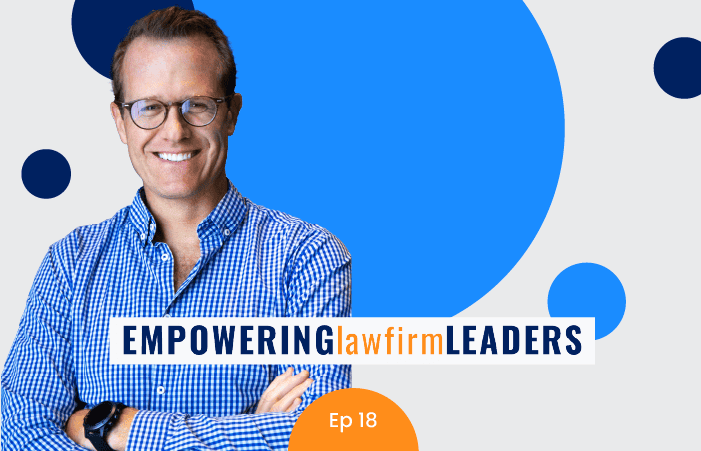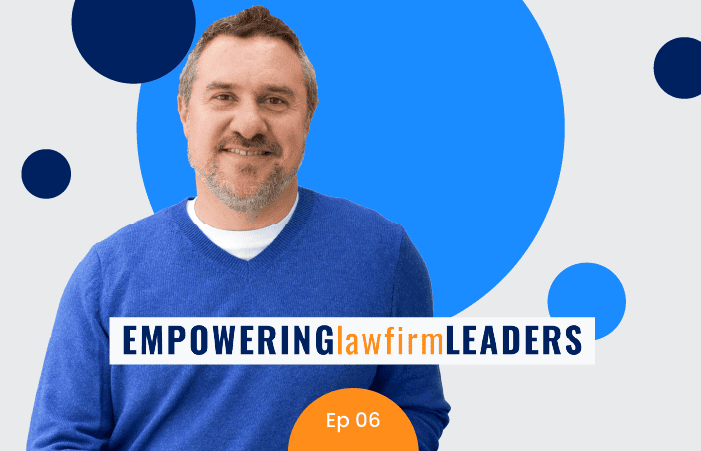Contents
How law firms can grow their business through referrals
In episode 22 of the Empowering Law Firm Leaders podcast, Robert discusses how law firms can grow their business through referrals. He shares insights on building effective referral networks, qualifying referrals, and managing complex referrals.
Robert Flint, practising corporate lawyer and CEO of Adviserly, offers his expertise on overcoming common referral challenges and delivering excellent client service.
In this conversation we cover:
- Lessons learned through collaboration in the modern world
- Qualifying referrals using the BTOP method
- Managing complex referrals
- Avoiding bad habits
- Understanding personality types
- The role of generosity
- Leveraging technology to scale referral strategies
Lessons learned through collaboration
Collaboration is a cornerstone of successful referrals, but it is not without its challenges. Robert highlights the structural problems with collaboration, using an example from the healthcare sector. He recounts the story of a young girl who nearly died due to misdiagnosed appendicitis, despite her mother being a GP. This case underscores the importance of challenging assumptions and ensuring effective communication within referral networks.
Robert advises law firms to “trust but verify” when collaborating with others. He stresses the need for humility and the willingness to learn from mistakes. “Treat collaboration and referrals like a skill that you have to learn,” he says. By approaching referrals with a mindset of continuous improvement, law firms can build stronger, more effective networks.
Qualifying referrals: The BTOP method
One of the key concepts in Robert’s book is the BTOP method for qualifying referrals. This method helps determine whether a referral is worth pursuing immediately or should be considered for the future. “BTOP stands for Budget, Team, Other Parties, and Planning,” Robert explains. This framework ensures that referrals are accurate and relevant, preventing the frustration of mismatched expectations.
Robert emphasises the importance of having a clear understanding of the client’s budget and the team involved in the project. “You don’t want to refer those people to your trusted network because they’re incredibly annoying people to be referred to,” he notes. By asking the right questions upfront, law firms can ensure that referrals are well-qualified and likely to result in successful outcomes.
Managing complex referrals
Complex referrals involve multiple experts working together on a single project, making effective project management and communication essential. Robert points out that many law firms fail to acknowledge the complexity of these referrals, leading to mismanagement and client dissatisfaction. “Get that project manager in place,” he advises. Having a dedicated project manager ensures that all aspects of the referral are coordinated effectively.
Effective project management is crucial for handling complex referrals. It involves identifying the right person to oversee the project, ensuring that timelines, fees, and deliverables are managed efficiently. “Having actual project managers in law firms is incredibly useful,” he notes.
Good communication is another critical component of managing complex referrals. Robert recommends open and confident communication, particularly when dealing with different personalities and cultures. “Communication needs to be open, and it needs to be confident,” he says. By fostering a culture of clear communication, law firms can navigate the complexities of multi-disciplinary projects more effectively.
Avoiding bad habits when making referrals
Robert identifies three bad behaviours that are perhaps the easiest to fix, to ensure referrals are a success:
- Failing to express gratitude: One of the most common and easily fixable bad habits is not saying thank you for referrals. Robert observes that it is remarkably common for people to receive referrals and not even acknowledge them. Simple gestures of appreciation, such as sending a thank-you note or expressing gratitude in person, can go a long way in maintaining strong referral relationships.
- Poor online presence: Another critical area is ensuring that online profiles and websites are professional and up-to-date. Robert advises that having a good photograph on your LinkedIn profile and maintaining a well-designed website are essential. First impressions matter, and a well-maintained online presence can significantly impact the success of referral strategies.
- Lack of follow-up: Robert highlights the importance of following up with referral partners and clients. Often, after meeting potential referral partners at events, people fail to follow up due to being overwhelmed with other tasks. Setting up automated reminders and using CRM systems to facilitate follow-ups can help ensure that these connections are nurtured and maintained.
About the speaker

Robert Flint is a practising corporate lawyer and the CEO of Adviserly, a global referral network that connects boutique law firms. With extensive experience in both large London law firms and smaller boutique practices, Robert understands the unique challenges faced by law firms of all sizes. His book, Working with Strangers, offers practical advice on building effective referral networks and avoiding common pitfalls.
Robert’s journey began at Carbon Law Partners, where he encountered a significant challenge: the lack of external referral partners for practice areas he did not cover. “If you’re looking for a good commercial lawyer in Portugal, or have an M&A deal, that’s quite difficult to find,” he explains. Large law firms often do not provide the personal touch expected by clients of boutique firms, leading to a mismatch in service expectations and fees.
Robert emphasises the importance of having a network of like-minded boutique law firms to refer clients to. “An external outbound referral network was the priority,” he says. This network not only alleviates the stress of building one’s practice but also provides a community of lawyers who understand the unique challenges of running a small firm. This was Robert’s inspiration for building Adviserly.
The role of generosity in referrals
Robert emphasises that generosity is not just about making money; it is intrinsically good and beneficial for both the giver and the receiver. “Generosity is good in its own right,” he asserts. By giving referrals freely and without expectation, law firms can set a positive tone for collaboration and create a supportive network.
Case Study: Creative Heist
One of the most compelling examples of generosity in referrals comes from the case study of Creative Heist, a firm that has mastered the art of leveraging generosity to build strong referral networks. In this case study, Fred Cox from Creative Heist shares his strategy of taking clients out for dinner and inviting potential clients to join. This approach not only strengthens existing relationships but also opens the door to new opportunities.
Fred explains that to get referrals, you have to give referrals. Fred shares that, “If you have a client that you really like and you want more clients like them, take them out for dinner”. Taking clients out for dinner and inviting potential clients creates a relaxed and informal setting where genuine connections can be made. It allows law firms to showcase their expertise and build trust without the pressure of a formal business meeting. “Rather than just do that, why not also say, well, you can also invite other potential clients,” he suggests.
Generosity in referrals goes beyond just social events. It includes simple gestures such as expressing gratitude for referrals, sending thank-you notes, and acknowledging the efforts of referral partners. These actions create a positive feedback loop, encouraging referral partners to continue referring work and fostering a culture of mutual support.
The importance of experimentation to build an effective referral strategy
Experimentation is key in building a successful referral strategy because it allows law firms to gather valuable information and continuously improve their approach. Robert explains that failure should not be seen as a personal or deep setback but rather as a point on a graph that provides data for refining strategies. “It’s a way of getting information,” he says. By experimenting with different referral methods and analysing the outcomes, law firms can identify what works best and make informed adjustments.
Robert highlights that a referral strategy is inherently personal and involves building relationships with people. To develop a robust network, law firms need to meet various individuals and attend different events, some of which may not yield immediate results. “You’re going to meet lots of people that end up not being the right fit for you,” he notes. These experiences, though they may feel like failures, provide critical insights into where to focus efforts and which events or individuals are most beneficial.
He advises law firms to look at the data from their referral activities, such as the characteristics of successful clients and referral partners, and use this information to refine their strategy. “Look at what’s going right and what’s going wrong,” he suggests. By treating referrals as a strategic process and continuously experimenting with different approaches, law firms can build a more effective and sustainable referral network.
Leveraging technology to scale referral strategies
Technology plays a crucial role in scaling referral strategies. Robert recommends using CRM systems to automate follow-ups and maintain consistent communication with referral partners. “Hooking up your LinkedIn to your CRM can ditch that admin-heavy stage,” he advises. By integrating technology into referral processes, law firms can streamline their efforts and focus on building meaningful relationships.
Automated reminders and personalised emails can help law firms stay top-of-mind with clients and referral partners. “Use technology to facilitate those interactions,” Robert emphasises. By leveraging tech tools, law firms can enhance their referral strategies and achieve sustainable growth.
By leveraging technology for data analysis, law firms can gain valuable insights into their referral activities. This data can help identify trends, measure the effectiveness of referral strategies, and make informed decisions.
Build a sustainable referral network to boost organic growth
By understanding the nuances of referral qualification, managing complex referrals, showing gratitude, and leveraging technology, law firms can create robust networks that drive growth and success. You can read more of Robert’s insights in his book, Working with Strangers, which offers valuable guidance for law firms looking to thrive in the modern legal landscape.
Watch the full interview with Robert Flint now to discover more advice and guidance on building an effective referral strategy. You’ll also hear Robert’s exclusive advice understanding referral personality types.




